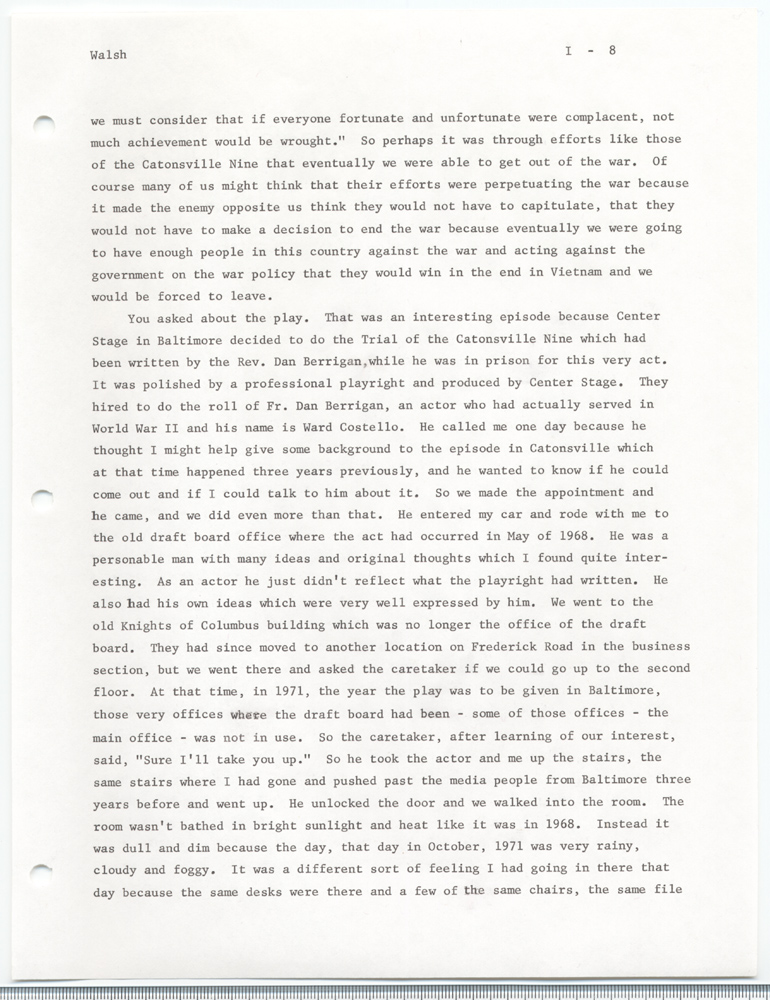 |
The Catonsville Nine's invasion and burning of the Catonsville draft board files: an interview with Jean S. Walsh given on March 30, 1973.
 |
12 / 15 |
 |



| Collection: |
Friends of Catonsville Library |
| Date: |
1973-03-30 |
| Date of Digitization: |
2004-03-31 |
| Source: |
Catonsville Library |
| Original Dimensions: |
28 x 22 cm |
| Creator: |
Walsh, Jean S. |
|
|
Description:
A transcript of a recorded interview with Jean S. Walsh, the editor of Catonsville's local newspaper, the Catonsville Times. She was present at the scene after the burning of draft records in Catonsville on May 17, 1968.
Transcription: we must consider that if everyone fortunate and unfortunate were complacent, not
much achievement would be wrought." So perhaps it was through efforts like those
of the Catonsville Nine that eventually we were able to get out of the war. Of
course many of us might think that their efforts were perpetuating the war because
it made the enemy opposite us think they would not have to capitulate, that they
would not have to make a decision to end the war because eventually we were going
to have enough people in this country against the war and acting against the
government on the war policy that they would win in the end in Vietnam and we
would be forced to leave.
You asked about the play. That was an interesting episode because Center
Stage in Baltimore decided to do the Trial of the Catonsville Nine which had
been written by the Rev. Dan Berrigan,while he was in prison for this very act.
It was polished by a professional playright and produced by Center Stage. They
hired to do the roll of Fr. Dan Berrigan, an actor who had actually served in
World War II and his name is Ward Costello. He called me one day because he
thought I might help give some background to the episode in Catonsville which
at that time happened three years previously, and he wanted to know if he could
come out and if I could talk to him about it. So we made the appointment and
he came, and we did even more than that. He entered my car and rode with me to
the old draft board office where the act had occurred in May of 1968. He was a
personable man with many ideas and original thoughts which I found quite inter-
esting. As an actor he just didn't reflect what the playright had written. He
also had his own ideas which were very well expressed by him. We went to the
old Knights of Columbus building which was no longer the office of the draft
board. They had since moved to another location on Frederick Road in the business
section, but we went there and asked the caretaker if we could go up to the second
floor. At that time, in 1971, the year the play was to be given in Baltimore,
those very offices where the draft board had been - some of those offices - the
main office - was not in use. So the caretaker, after learning of our interest,
said, "Sure I'll take you up." So he took the actor and me up the stairs, the
same stairs where I had gone and pushed past the media people from Baltimore three
years before and went up. He unlocked the door and we walked into the room. The
room wasn't bathed in bright sunlight and heat like it was in 1968. Instead it
was dull and dim because the day, that day in October, 1971 was very rainy,
cloudy and foggy. It was a different sort of feeling I had going in there that
day because the same desks were there and a few of the same chairs, the same file
|




